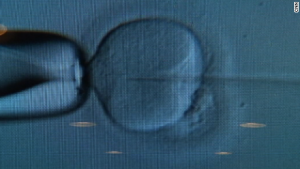The first known attempt at creating genetically modified human embryos in the United States has been carried out by a team of researchers in Portland, Oregon, MIT Technology Review has learned.
The effort, led by Shoukhrat Mitalipov of Oregon Health and Science University, involved changing the DNA of a large number of one-cell embryos with the gene-editing technique CRISPR, according to people familiar with the scientific results.
Until now, American scientists have watched with a combination of awe, envy, and some alarm as scientists elsewhere were first to explore the controversial practice. To date, three previous reports of editing human embryos were all published by scientists in China.
“Controversial practice”. #sigh
Now Mitalipov is believed to have broken new ground both in the number of embryos experimented upon and by demonstrating that it is possible to safely and efficiently correct defective genes that cause inherited diseases.
In altering the DNA code of human embryos, the objective of scientists is to show that they can eradicate or correct genes that cause inherited disease, like the blood condition beta-thalassemia. The process is termed “germline engineering” because any genetically modified child would then pass the changes on to subsequent generations via their own germ cells—the egg and sperm.
Some critics say germline experiments could open the floodgates to a brave new world of “designer babies” engineered with genetic enhancements—a prospect bitterly opposed by a range of religious organizations, civil society groups, and biotech companies.
Faster please.

 MIT Technology Review:
MIT Technology Review:
Clearly “biotechnology” is a huge beneficiary for not only our species of human, but even that of lower-animals as well to expand our livelihoods of several years and a few decades.
So this is a good approach of CRISPR that’s been examined by the scientific community for years and a few decades of for us humans and non-human organisms.
A single cell is technically a zygote when it splits to 12-16 cells it’s a morula. I don’t think it’s incorrect to refer to a zygote as an embryo, but I think the general population will have an adverse reaction to genetically modifying embryos. It’s really gene editing a single cell and most people don’t have an aversion to modifying single cells.